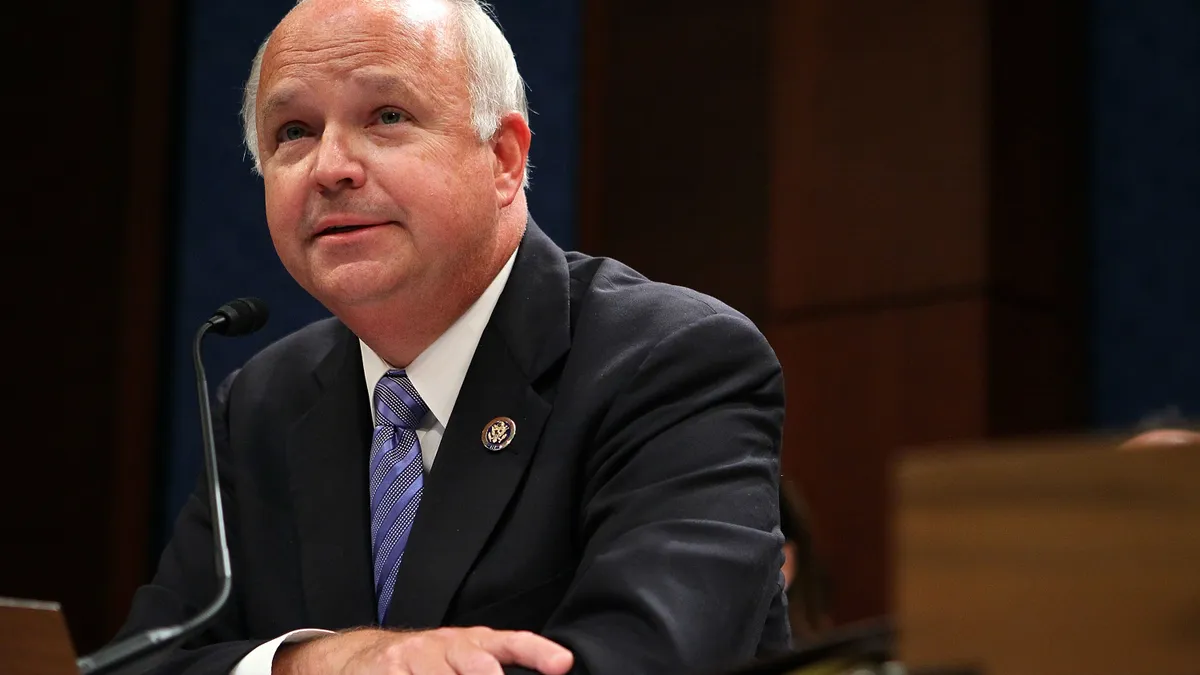Dive Brief:
- Former U.S. Rep Jo Bonner, the chief of staff to the Republican governor of Alabama, was named president of the University of South Alabama on Wednesday, beating out two finalists with doctoral degrees and more higher education experience.
- Bonner, a member of Congress for a decade and a former vice chancellor for economic development for the University of Alabama System, is due to be formally introduced at the Board of Trustees' next meeting in December.
- His appointment matches a trend in recent years of legislators taking top leadership positions at colleges, prompting concerns that their political connections secured them the jobs.
Dive Insight:
In announcing Bonner as the U of South Alabama's fourth president, the trustee board chair pro tempore praised him as a "respected, admired and influential leader" in the state who would help elevate the institution's reputation.
In addition to his economic development role at the U of Alabama, Bonner helped the system with government relations for a couple of years. Before starting as Gov. Kay Ivey's chief of staff in 2018, he was the interim executive director of an industrial development authority.
He bested two other finalists, Damon Andrew, a dean and professor at Florida State University's College of Education, and Michael Tidwell, the past president of the University of Texas at Tyler.
Both candidates had doctorates, while Bonner's highest degree is a bachelor's in journalism from the University of Alabama.
A college president without a terminal degree and with little experience as an administrator may on its face appear unorthodox. But a substantial number of institutions have looked to bring in presidents and chancellors from atypical backgrounds, sometimes from corporate or political realms. The most recent data available from the American Council on Education shows that in 2016, 15% of presidents came from outside higher ed.
Governing boards might want to hire a politician because they believe that individual could leverage relationships with policymakers to secure more state funding, said Judith Wilde, a policy and government professor at George Mason University, who has studied presidential searches extensively.
"Having the governor's ear may be a help there," Wilde said.
Bonner also brings extensive financial management skills, which college administrators sometimes lack, she said.
A U of South Alabama spokesperson did not immediately respond to a request for comment.
But those from outside academia often do not know how to interact with faculty members, nor do they always grasp the importance of shared governance, Wilde said. However, depending on how a college is organized, a provost might take on the duty of handling faculty, she said.
Sometimes, shared governance breaks down when colleges select presidents with a history in politics, Wilde said. Candidates may not be made public, a leader may be hired against the campus community's wishes, or outside forces may influence a search.
Such was the case at the University of South Carolina, where the board in 2019 picked the now-former president, Robert Caslen, after the state's Republican governor reportedly called trustees to ask them to vote for him. Caslen, who had been superintendent of the U.S. Military Academy at West Point, resigned this year after admitting to plagiarism.
Wilde said she had no evidence the governor pushed for Bonner's hiring in Alabama. But she said she found it interesting that the board picked the finalist with the least experience and strongest state political connections among the three.
"The other two seemed to have a better background for this," she said, noting too the board passed on a Black man, Tidwell.
Politicos have not always made the best presidents.
In Colorado, Mark Kennedy, a former GOP member of Congress, left the University of Colorado system presidency in July after only two years on the job. Faculty at the flagship Boulder campus censured Kennedy for his stance on diversity issues after he took heat for his handling of diversity issues, including using the term "trail of tears" colloquially. He also was criticized for not respecting shared governance.
But some politicians have enjoyed longer and more successful tenures. John Thrasher was a Republican politician in Florida before a roughly seven-year run as Florida State University's president ending this year. And Marty Meehan was a Democratic member of Congress who became chancellor of the University of Massachusetts Lowell and is now president of the UMass system.















